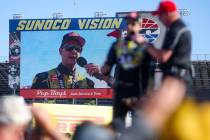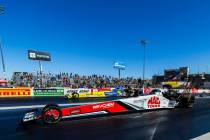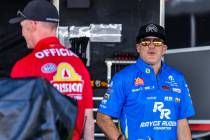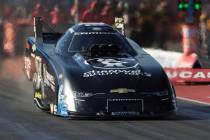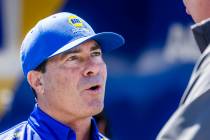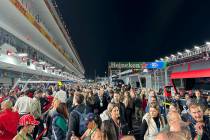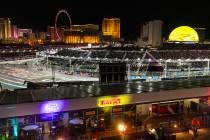Safety, not hype, should be focus of NHRA leadership
The National Hot Rod Association picked the wrong aspect of NASCAR's game plan to emulate.
The drag racing organization first should have looked to follow NASCAR's emphasis on safety and accident research during the past six years instead of copying its Nextel Cup Chase for the Championship points system.
Welcome to this year's inaugural NHRA Countdown to One.
The laughable nature of this format can be traced to its misleading name: Four champions -- not one -- will be crowned at next weekend's event in Pomona, Calif.
Only four drivers in each of four pro divisions remain in contention for season titles.
The ACDelco Las Vegas NHRA Nationals at Las Vegas Motor Speedway, where professional categories begin racing today, has been the pro tour's penultimate event since the track was awarded a second annual NHRA Powerade Drag Racing Series race in 2001.
In all but one of the those years, near-capacity Las Vegas crowds shared in a championship celebration. Las Vegas has become the first of two final "playoff" events.
NHRA leadership -- that's a real oxymoron -- should have researched how to keep drivers safe in Top Fuel dragsters and Funny Cars instead of scheming how to attract more attention for its final races.
The Countdown hasn't created a national buzz.
Most mainstream exposure the NHRA has received this year resulted from the death of Eric Medlen in a Funny Car testing accident in March and the near-tragic crash of his boss and mentor, John Force, four weeks ago near Dallas.
The death of NHRA founder Wally Parks a month ago at age 94 should be the calling for his followers to stress safety like he did in the sport's early days. Want more media? Announce as a tribute to Parks that the NHRA has renewed its emphasis on safety with a plan and financial commitment to back it.
The Securities and Exchange Commission has approved the NHRA's sale of its professional racing assets, including the Powerade series, to HD Partners Acquisition Corp. If HD stockholders approve the sale, don't expect much to change because the NHRA regime will be retained and the NHRA will continue to sanction the pro races.
The NHRA will receive $100 million from the sale, and a significant portion -- say, $20 million -- should be earmarked for safety research and development.
Someone who has raced and, more importantly, knows how to build dragsters and Funny Cars should lead that effort. That's a big void now. Were a research and development department to be created, it could begin by examining the reliability of chassis and tires in Top Fuel and Funny Car.
Even without such an entity, drag racing needs to focus on how to slow these 330 mph cars by at least 20 mph. A reduction in speed will make them safer, promote more side-by-side racing and reduce the cost of running these monsters.
A few top drivers have suggested reducing the sizes of rear wings on dragsters and ridiculous Batmobile-like rear decks on Funny Cars. That, they say, will force crew chiefs to cut horsepower to compensate for the loss of aerodynamic downforce that apparently puts too much pressure on chassis components and Goodyear's rear slicks.
For safety's sake, something must be done. Now.
"I told John when I went to see him (in the hospital) that I don't want to add another name to a prayer I say. It takes too long to say it now," Funny Car driver and four-time world champion Gary Scelzi said. "I'd just as soon not have to put a (memorial) stripe through my car number again or run another sticker that says 'In Loving Memory of.' ''
The NHRA's revamped points system, ensuring all pro champions will be feted in Pomona at the NHRA-owned season finale, will cheat Las Vegas. But the whole sport has been cheated with the deaths of Top Fuel driver Darrell Russell (three years ago in a racing accident) and Medlen. Then there's Force, who'll be in a wheelchair or using a walker at LVMS this weekend.
Force has spearheaded a safety campaign called the Eric Medlen Project since the popular driver's fatal crash. While Force has forged ahead with the NHRA's blessings, the NHRA continues to post abysmal reaction times about driver safety issues.
One well-respected professional driver said, "People making decisions at NHRA are not capable of making them correctly."
The burden, sadly, has fallen on team owners to fund research on how to make these rockets safer.
Drivers need to unite and force the NHRA to return to its primary mission of safety, which was a major motivation for Parks to create the organization 56 years ago.
Jeff Wolf's motor sports column is published Friday. He can be reached at 383-0247 or jwolf@reviewjournal.com.
JEFF WOLFMORE COLUMNS











